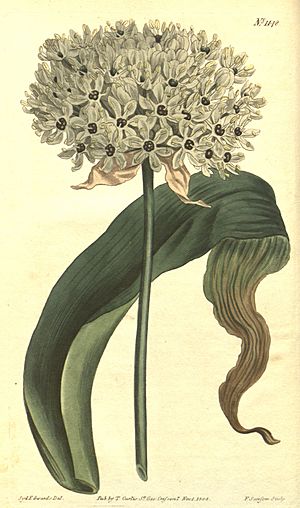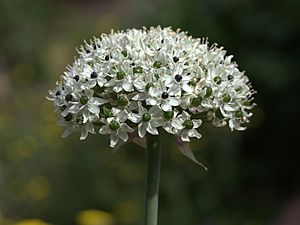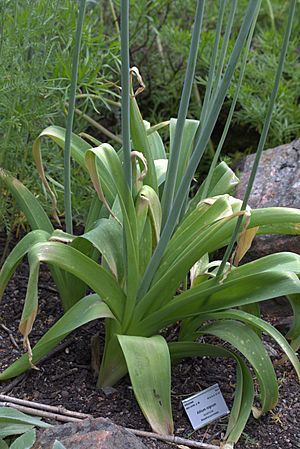Broad-leaved leek facts for kids
Quick facts for kids Black garlic |
|
|---|---|
 |
|
| 1809 illustration (as Allium magicum) | |
| Scientific classification | |
| Synonyms | |
|
Synonymy
Allium afrum (Zucc.) Kunth
Allium bauerianum Baker Allium cyrilli var. magicum (L.) Nyman Allium littoreum G.Don Allium magicum L. Allium multibulbosum Jacq. Allium nigrum f. album Maire Allium nigrum f. roseum Maire Allium odorum Ten. 1811, illegitimate homonym not L. 1767 Allium paniculatum Viv. 1824, illegitimate homonym not L. 1759 Allium paucibulbosum (Haw.) Steud. Canidia magica (L.) Salisb. Kalabotis nigrum (L.) Raf. Molium nigrum (L.) Haw. Molium paucibulbosum Haw. Ophioscorodon magicum (L.) Wallr. Ornithogalum afrum Zucc. |
Allium nigrum, also known as black garlic, broad-leaved leek, or broadleaf garlic, is a type of wild onion. It comes from the Middle East. Unlike most other plants in its family, it does not smell like onion or garlic.
This plant grows naturally in countries like Turkey, Cyprus, Syria, Lebanon, and Israel. People also grow it as a beautiful garden plant in many other places. It has even started growing on its own in some areas, such as parts of the United States (like Washington and Oregon).
Contents
What Black Garlic Looks Like
Allium nigrum grows bulbs that are not perfectly round, measuring up to 5 centimeters (about 2 inches) across. Each plant has 3 to 6 leaves. These leaves are long and flat, shaped like a spear, and can be up to 60 centimeters (about 2 feet) long and 2.5 centimeters (1 inch) wide. As the plant grows, its leaves may bend downwards.
The plant also has smooth, round flower stalks, called scapes, which can grow very tall, up to 80–100 centimeters (about 3 feet). At the top of each scape is a dense cluster of star-shaped flowers. Each flower is about 9 millimeters (less than half an inch) wide. The flower parts that look like petals, called tepals, are white with a green line down the middle. The parts that hold pollen, called anthers, can be purple or yellow. The parts that hold the seeds, called ovaries, are black-green when the flower is open. However, they are green when they are younger or after the flower has finished blooming.
How Scientists Classify Black Garlic
Scientists group living things into categories. Allium nigrum is the main plant in a group called Section Melanocrommyum. Scientists use special tests to study plants. These tests show that A. nigrum is a very diverse species. This means it has many different forms or types within it.
Sometimes, scientists find new information that changes how they classify plants. For example, some plants that were once thought to be part of A. nigrum are now considered separate species. This happens when new evidence, often from studying the plant's genes, shows they are different enough to be their own species.
Why it's Called "Nigrum"
The name nigrum comes from a Latin word that means "black." This name was chosen because of the black-green color of the plant's ovaries when the flowers are open.
Uses of Black Garlic
Allium nigrum is a popular plant for gardens in Europe and North America. It was first brought to these places in the early 1900s. Today, it is also grown in Taean and Seosan in South Korea.
See also
 In Spanish: Allium nigrum para niños
In Spanish: Allium nigrum para niños



